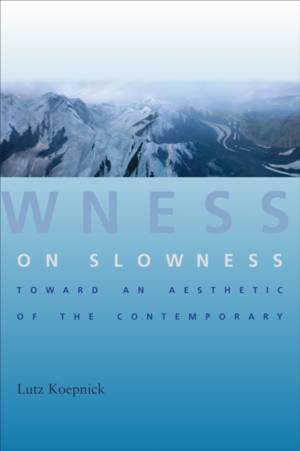
- Afhalen na 1 uur in een winkel met voorraad
- Gratis thuislevering in België vanaf € 30
- Ruim aanbod met 7 miljoen producten
- Afhalen na 1 uur in een winkel met voorraad
- Gratis thuislevering in België vanaf € 30
- Ruim aanbod met 7 miljoen producten
Zoeken
Omschrijving
Speed is an obvious facet of contemporary society, whereas slowness has often been dismissed as conservative and antimodern. Challenging a long tradition of thought, Lutz Koepnick instead proposes we understand slowness as a strategy of the contemporary--a decidedly modern practice that gazes firmly at and into the present's velocity.
As he engages with late twentieth- and early twenty-first-century art, photography, video, film, and literature, Koepnick explores slowness as a critical medium to intensify our temporal and spatial experiences. Slowness helps us register the multiple layers of time, history, and motion that constitute our present. It offers a timely (and untimely) mode of aesthetic perception and representation that emphasizes the openness of the future and undermines any conception of the present as a mere replay of the past. Discussing the photography and art of Janet Cardiff, Olafur Eliasson, Hiroshi Sugimoto, and Michael Wesely; the films of Peter Weir and Tom Tykwer; the video installations of Douglas Gordon, Willie Doherty, and Bill Viola; and the fiction of Don DeLillo, Koepnick shows how slowness can carve out spaces within processes of acceleration that allow us to reflect on alternate temporalities and durations.Specificaties
Betrokkenen
- Auteur(s):
- Uitgeverij:
Inhoud
- Aantal bladzijden:
- 336
- Taal:
- Engels
- Reeks:
Eigenschappen
- Productcode (EAN):
- 9780231168328
- Verschijningsdatum:
- 7/10/2014
- Uitvoering:
- Hardcover
- Formaat:
- Genaaid
- Afmetingen:
- 155 mm x 231 mm
- Gewicht:
- 566 g

Alleen bij Standaard Boekhandel
+ 142 punten op je klantenkaart van Standaard Boekhandel
Beoordelingen
We publiceren alleen reviews die voldoen aan de voorwaarden voor reviews. Bekijk onze voorwaarden voor reviews.











